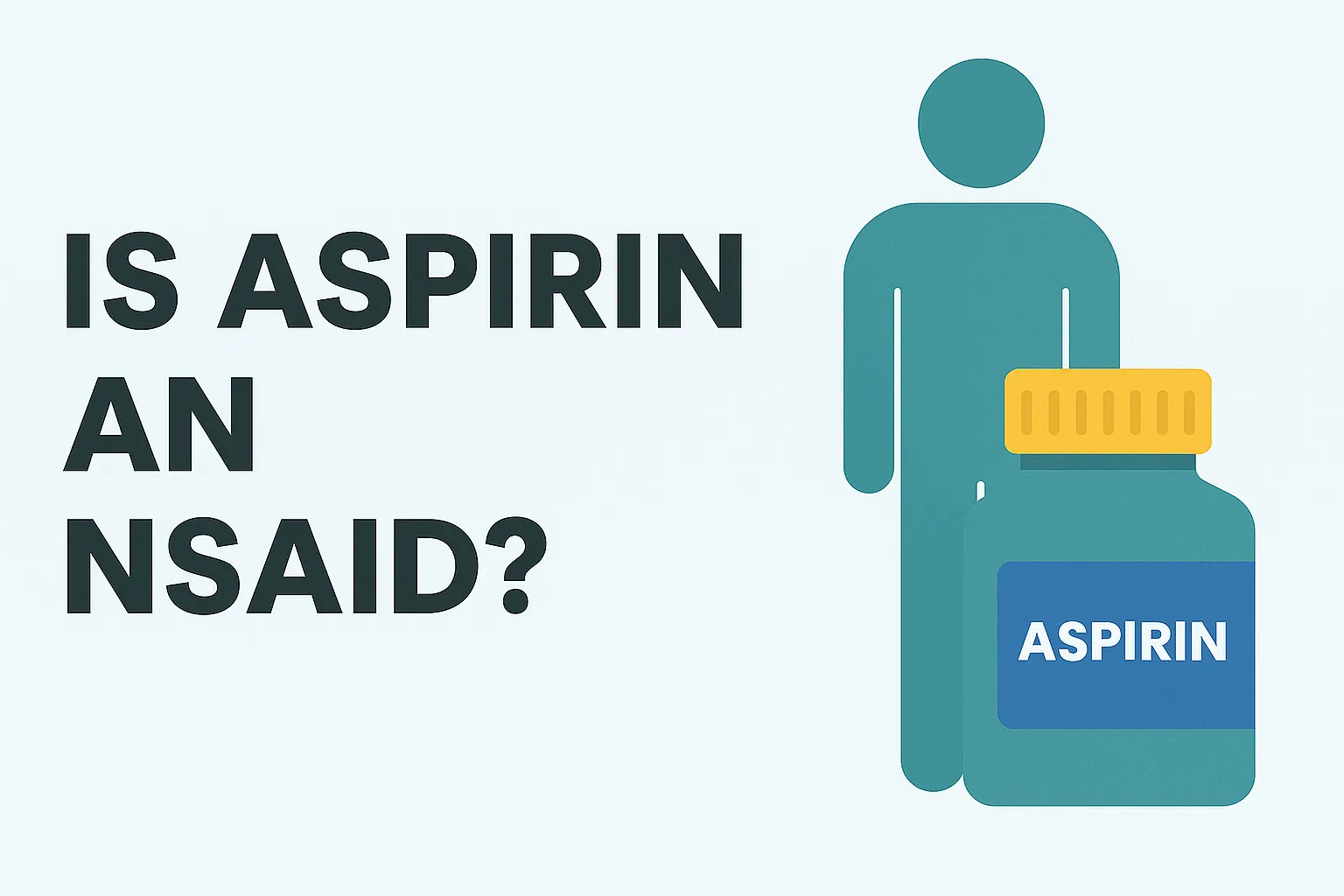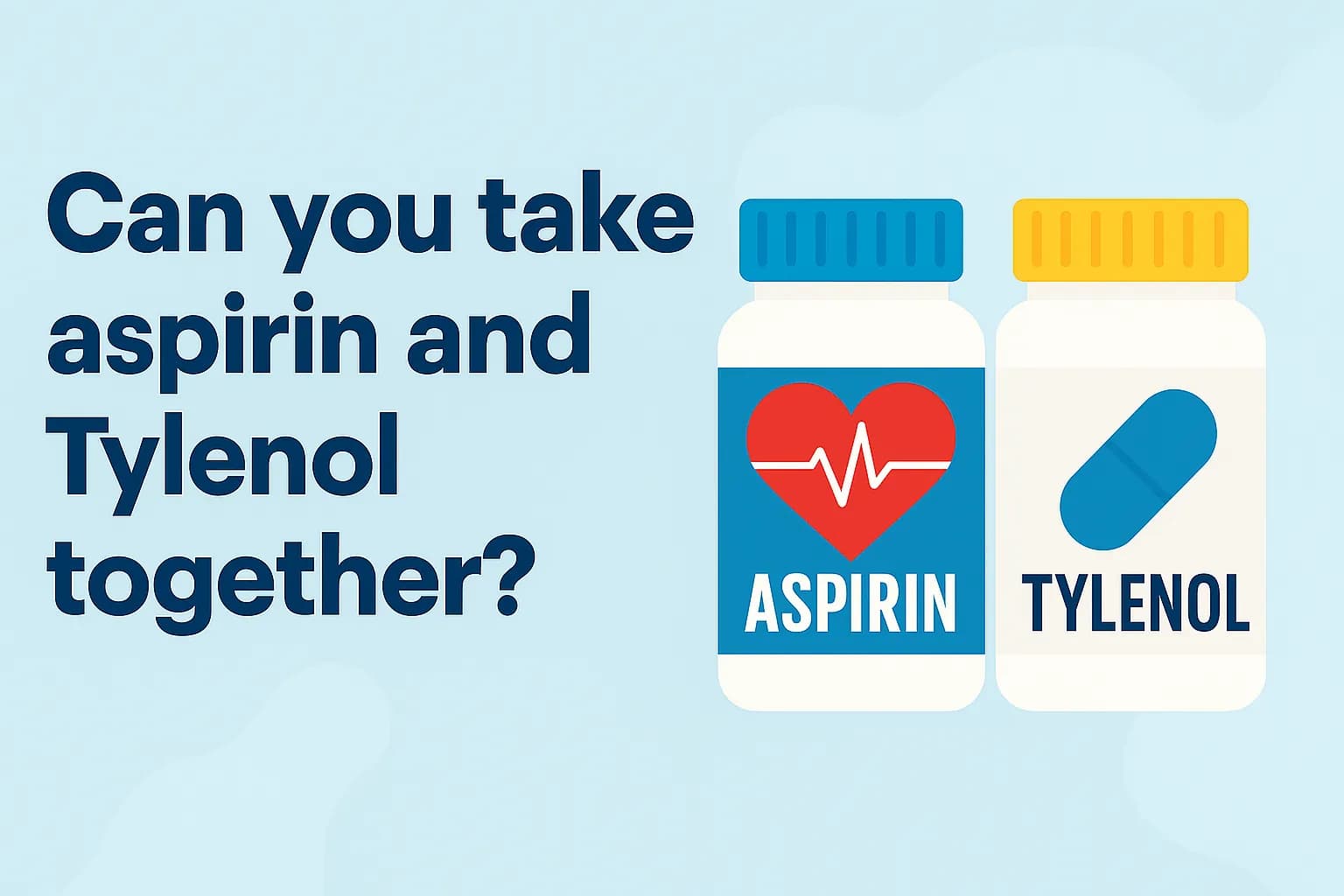Is aspirin an NSAID?

Aspirin is one of the most common over-the-counter drugs for treating minor pain from headaches, muscle aches, toothaches, and menstrual cramps, and for reducing fever. Aspirin belongs to the class of medications called nonsteroidal anti-inflammatory drugs (NSAIDs), which also includes ibuprofen (Advil, Motrin) and naproxen (Aleve, Naprosyn). NSAIDs work by blocking cyclooxygenase (COX) enzymes, preventing the production of prostaglandins that cause swelling, fever, and pain.
What is aspirin used for?
Aspirin, or acetylsalicylic acid (ASA), is used for:
- Pain relief (analgesic): mild to moderate pain such as headaches, menstrual cramps, toothaches, and muscle aches
- Fever reduction (antipyretic): lowers fever associated with infections
- Anti-inflammatory: reduces inflammation in conditions like osteoarthritis and rheumatoid arthritis
- Blood thinner (antiplatelet agent): low-dose daily aspirin helps prevent blood clots, reducing the risk of heart attack, stroke, and transient ischemic attack in people with cardiovascular risk factors
Aspirin can cause stomach irritation, ulcers, or increased bleeding, especially with long-term or high-dose use. Use cautiously if you have gastrointestinal issues or bleeding risk.
How does aspirin work?
Aspirin blocks cyclooxygenase enzymes (COX‑1 and COX‑2). At higher doses (e.g., 325 mg), it blocks both to relieve pain, inflammation, and fever. At low doses (e.g., 81 mg), it preferentially inhibits COX‑1 to prevent platelet aggregation, acting as a blood thinner.
What are the side effects of aspirin?
- Gastrointestinal issues: stomach pain, heartburn, nausea, vomiting
- Mild bleeding: easy bruising, increased bleeding from cuts
- Serious GI bleeding or ulcers: black, tarry stools or coffee-ground vomit
- Allergic reactions: hives, itching, swelling, severe dizziness, trouble breathing
- Increased risk of serious bleeding: prolonged bleeding from cuts, spontaneous bleeding
- Reye’s syndrome (children and teenagers): rare, serious liver and brain swelling; avoid aspirin in viral illnesses unless directed by a doctor
- Kidney problems: possible impairment with long-term or high-dose use
- Liver damage: rare, more likely with high doses or preexisting liver disease
- Tinnitus or hearing loss: ringing in ears at higher doses
What drug interactions are there with aspirin?
Aspirin may interact with other medications, including:
Shop Medications
- Other NSAIDs (diclofenac, ibuprofen, celecoxib, naproxen)
- SSRIs and other antidepressants (citalopram, fluoxetine, paroxetine, venlafaxine, sertraline)
- Anticoagulants/blood thinners (apixaban, clopidogrel, enoxaparin, heparin, rivaroxaban, warfarin)
- Blood pressure medications (ACE inhibitors, diuretics)
- Herbal supplements (feverfew, garlic, ginger, ginkgo biloba, horse chestnut)
- Diabetes and glaucoma medications (acetazolamide, methazolamide)
- Steroids (prednisone)
- Methotrexate
- Cidofovir
- Alcohol
- Alendronate
- Bismuth subsalicylate
- Flavocoxid
- Pemetrexed
- Sulfinpyrazone
- Varicella live vaccine
What warnings or precautions are there with aspirin?
Before using aspirin, inform your doctor or pharmacist if you have:
- An allergy to aspirin or salicylates
- A stomach ulcer or gastrointestinal bleeding
- High blood pressure
- Indigestion or upset stomach
- Asthma or lung disease
- Bleeding disorders (hemophilia, vitamin K deficiency)
- Liver or kidney disease
- Gout
- Heavy menstrual bleeding
- Pregnancy, planning pregnancy, or breastfeeding
What are some natural anti-inflammatories?
Alternatives to NSAIDs include:
- Omega‑3 fatty acids
- Zinc
- S‑adenosylmethionine (SAM‑e)
- Capsaicin
- Green tea extract
- Vitamin C and Vitamin D
- Garlic
- Resveratrol
- Bromelain
Consult your healthcare provider before starting any supplement.
Related Medications
- Tylenol (acetaminophen)
- Bayer Enteric-Coated Aspirin (acetylsalicylic acid)
- Motrin (ibuprofen)
- Aleve (naproxen)
- Plavix (clopidogrel)
- Coumadin (warfarin)
- Xarelto (rivaroxaban)
- Eliquis (apixaban)
Sources
- American Heart Association. Aspirin and heart disease. Accessed Sept. 10, 2024.
- Food and Drug Administration. Aspirin for reducing your risk of heart attack and stroke: Know the facts. Accessed Sept. 10, 2024.
- Arnett D, Blumenthal R, Albert M, et al. 2019 ACC/AHA Guideline on the Primary Prevention of Cardiovascular Disease. JACC. 2019;74(10):e177–e232.
- Bayer HealthCare LLC. Bayer low dose‑aspirin tablet [package insert]. DailyMed. Accessed Sept. 10, 2024.
- Medscape. Aspirin (Rx, OTC). Accessed Sept. 10, 2024.





